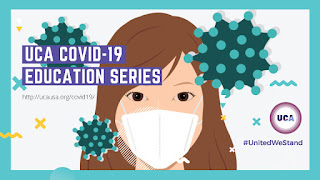53. How to minimize the risk of infection in large social gatherings during the COVID pandemics?
Q: How to minimize the risk of infection in large social gatherings during the COVID pandemics?
💁Tracy: In the COVID pandemics, social gatherings present a very challenging situation and a real increased risk of infection, especially if there is a large crowd of people. This risk is greatly heightened if:
- a large number of people do not wear masks or practice good hygiene;
- in very confined space, especially indoors;
- in very crowded settings, especially if social distancing cannot be maintained;
- in very emotional situations that are difficult to predict or contain the outcome (such as funerals or large parties);
- if many people will be singing, chanting, or talking loudly, such as in large rallies, protests, marches, etc.
Please read carefully CDC's guideline on mass gathering, and how to plan and prepare such events. Minimize such events unless absolutely needed.
If you want to attend such events, please weigh in your benefits versus risks very carefully. Everyone’s situation is different. Do not feel obliged to go to such events because of peer pressure. Make your own best decision.
If you want to attend such events, please weigh in your benefits versus risks very carefully. Everyone’s situation is different. Do not feel obliged to go to such events because of peer pressure. Make your own best decision.
For people who are under the high-risk category, such as elders, those with underlying health conditions, those with physical constraints or non-ideal health conditions, think through the situation carefully.
If you decide to attend, plan and prepare ahead of time. Plan different situations that could happen during the event, especially if you cannot control the situation. Come up with all possible scenarios that the events could go wrong and will not happen according to the original intention or plan. In other words, all the “What if …” scenarios. Prepare different options and solutions that you will use, under these different circumstances. Thinking ahead of time will help you become mentally prepared, so you will not panic and act irrationally in case something unexpected happens.
Think clearly and calmly about your intention and expected outcome for attending this event (not other people’s, but your own), and how the event can help you or harm you in your goal (especially if the event goes off rail). Also think and plan how you want to achieve and stick to your goal in the event. Setting a clear mental picture will help you overcome unexpected and difficult situations with a firm commitment, so you will not be easily swung by other people’s ad hoc, emotional or reactive responses.
In large social gatherings, people’s emotions can be raw and easily aroused by other factors outside organizers’ control. This means such events can be hard to predict, turning into something more explosive possibly even violent, especially in a large party, rally or protest. This also means, you need to be constantly aware of what’s happening around you. Set a goal to leave and exit as soon as possible in case something goes wrong. Act calmly and smartly!
COVID specific considerations:
- Keep yourself healthy before going to the event, such as take adequate rest, drink plenty of water, eat healthily and take Vitamins (take chewable Vitamin C before, during, and after the event may be helpful too). Learn to de-stress, do not overwhelm yourself, especially if you are involved in event organizing.
- Wear masks: if the gathering is large and crowded, and under a very high-risk situation, wear a gas mask or N95 mask is recommended. Always bring spare masks for replacement and sandwich bags to store the used masks.
- Do not touch your face, wear gloves if possible, bring spare ones, along with disinfectant wipes and hand sanitizers.
- Bring plenty of water for drinking and washing, and saline water to rinse eyes, nose, and mouth.
- Try to wear long pants, long sleeves shirt, hats, protective glasses even sun glasses.
- Plan ahead of time means of transportation. If you have to take public transportation, try to practice the same hygiene rules.
- During the event, maintain social distancing, especially from those who are not wearing masks, not practice hygiene, or speakers without masks in a crowded group. Talking loud without a mask can spread a large amount of droplets to far distance. If you have to absolutely stand close to the person, then do everything you could to protect yourself.
- Move swiftly during the event if you can (such as in a party, rally or march); Do not spend too much time in talking and interacting with a fixed group of people (unless you absolutely know they are healthy and uninfected); Minimize the time you stay and interact with others.
- When you finish the event, wash your hands, face, and other exposed area of the body. Rinse your mouth, nose, eyes, with saline water if needed.
- When you return to your residence, take off all your outfit before entering the house. Leave them outside or in storage for a few days, such as in a laundry bag or garbage bag. Alternatively, laundry them immediately.
- Before you interact with other people in your household, take a shower immediate after you return home.
References

[1] https://www.cdc.gov/coronavirus/2019-ncov/prevent-getting-sick/index.html
[2] https://www.cdc.gov/coronavirus/2019-ncov/community/organizations/business-employers/bars-restaurants.html
[2] https://www.cdc.gov/coronavirus/2019-ncov/community/organizations/business-employers/bars-restaurants.html
Writing: Helen Shih, PhD, UCA COVID Prevention Team.



